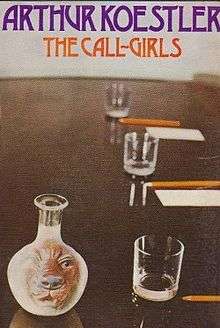The Call-Girls

The Call-Girls: A Tragi-Comedy with Prologue and Epilogue is a novel (ISBN 0-09-112550-2) by Arthur Koestler.[1] Its publication date is given as 1 January 1972 and its plot tells the story of a group of academic scientists struggling to understand the human tendency towards self-destruction, while the group members gradually become more suspicious and aggressive towards each other.[2][3][4][5]
The prologue and epilogue are two short stories which are connected to the main text of the novel by theme rather than plot. The prologue, "The Misunderstanding", is an interior monologue of Jesus Christ as he makes his way to the site of the Crucifixion. The epilogue, "The Chimeras", is a conversation between a psychiatrist and a man who believes that the world is being taken over by monsters.
In this novel Koestler introduces the term cocacolonization to refer to the expansion of a typical modern diet, consisting of such fare as hamburgers, French fries, fat-rich snacks, soft drinks high in sugar. Nowadays the term is widely used by physicians when they want to explain, at least in part, the global expansion of obesity, diabetes and cardiovascular risk factors.[6]
References
- ↑ Fallowell, Duncan. "Interviews Arthur Koestler, The Art of Fiction No. 80" (The Paris Review, Summer 1984, No. 92)
- ↑ "'The Call Girls' Arthur Koestler" (LiberReview, 4 August 2010)
- ↑ "The Call Girls by Arthur Koestler" (Kirkus Reviews, April 10, 1973)
- ↑ Reid, Dr. Robert. "The call-girls speak out" (Astride the two cultures, edited by Harold Harris. New Scientist, 2 October 1975, page 32)
- ↑ "Books: Future Tense THE CALL GIRLS by ARTHUR KOESTLER" (Time magazine, April 9, 1973)
- ↑ Fremont-Smith, Eliot. "Arthur Koestler Essay - Koestler, Arthur (Vol. 3)" (Saturday Review of Education, May 1973, pp. 88, 90)